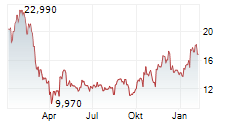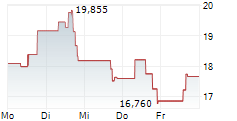
SOUTH SAN FRANCISCO, Calif., Dec. 05, 2024 (GLOBE NEWSWIRE) -- Denali Therapeutics Inc. (Nasdaq: DNLI) today announced initiation of dosing in a global Phase 2a clinical study, BEACON, of the investigational drug leucine-rich repeat kinase 2 (LRRK2) inhibitor BIIB122 (DNL151) in participants with LRRK2-associated Parkinson's disease (LRRK2-PD). LRRK2 inhibition is a potential therapeutic approach that may slow progression of Parkinson's disease by targeting underlying lysosomal dysfunction implicated in this disease.
The Phase 2a study is intended to evaluate safety and biomarkers associated with oral daily dosing of BIIB122 in approximately 50 participants with Parkinson's disease and LRRK2 pathogenic mutations confirmed by genetic testing. The study is designed to enroll participants into a double-blind treatment period of three months followed by an open label extension. Denali holds the Investigational New Drug application for this Phase 2a study and is leading its design and execution. This study is being funded under a Collaboration and Development Funding Agreement between Denali and a third party. BIIB122 is also being investigated in the ongoing global Phase 2b LUMA study in participants with early-stage Parkinson's disease with or without a LRRK2 mutation, in collaboration with Biogen.
"We are thrilled to initiate this study and broaden our efforts in evaluating BIIB122 as a potential treatment for people living with Parkinson's disease related to LRRK2 mutations," said Carole Ho, M.D., Chief Medical Officer at Denali. "We look forward to continued collaboration with the Parkinson's community as we aim to generate biomarker and safety data to inform how LRRK2 inhibition may have an impact on the course of this disease."
"LRRK2 continues to be a prominent target in Parkinson's research, and a priority area of focus for disease-modifying therapies," said Todd Sherer, Ph.D., Chief Mission Officer of The Michael J. Fox Foundation. "The Phase 2a study of BIIB122 is a meaningful milestone in advancing the potential of LRRK2 as a therapeutic approach for people with Parkinson's disease."
About LRRK2 and BIIB122 (DNL151)
Following discovery of the LRRK2 mutation as a pathogenic genetic factor for Parkinson's disease, further research has uncovered that it has the potential to be a novel therapeutic target for Parkinson's disease. Pathogenic mutations in LRRK2 account for 4-5% of familial and 1-2% of sporadic Parkinson's disease.1,2
BIIB122 (DNL151) is a selective, central nervous system-penetrant small molecule inhibitor of LRRK2 that is hypothesized to improve lysosomal dysfunction.
Denali's strategic partner Biogen is conducting the global Phase 2b LUMA study of BIIB122, which is expected to enroll approximately 640 participants with early-stage Parkinson's disease, including eligible participants with LRRK2 mutations. More information about the Phase 2b LUMA study (NCT05348785) can be found here.
The Phase 2a BEACON study is a multicenter, randomized, 12-week double-blind, placebo-controlled, parallel-group study, followed by an open label extension in participants with LRRK2-PD, which is defined as Parkinson's disease in individuals who are heterozygous or homozygous carriers of a pathogenic LRRK2 variant that increases LRRK2 kinase activity. This study's purpose is to evaluate the safety, tolerability, and pharmacodynamic effects of BIIB122. More information about the Phase 2a BEACON study (NCT06602193) can be found here.
BIIB122 is an investigational drug that is not approved by any regulatory authority, and its safety and efficacy have not been established.
About Denali Therapeutics
Denali Therapeutics is a biopharmaceutical company developing a broad portfolio of product candidates engineered to cross the blood-brain barrier for neurodegenerative diseases and lysosomal storage diseases. Denali pursues new treatments by rigorously assessing genetically validated targets, engineering delivery across the blood-brain barrier and guiding development through biomarkers that demonstrate target and pathway engagement. Denali is based in South San Francisco. For additional information, please visit www.denalitherapeutics.com.
Cautionary Note Regarding Forward-Looking Statements
This press release contains forward-looking statements within the meaning of the Private Securities Litigation Reform Act of 1995. Forward-looking statements expressed or implied in this press release include, but are not limited to, statements regarding Denali's plans, timelines, and expectations related to BIIB122 (DNL151) and its therapeutic potential; the enrollment, timing, and availability and impact of data related to the planned Phase 2a study and any future late-stage studies; the ongoing Phase 2b LUMA study, including expected enrollment; and statements made by MJFF's Chief Mission Officer and Denali's Chief Medical Officer. Actual results are subject to risks and uncertainties and may differ materially from those indicated by these forward-looking statements as a result of these risks and uncertainties, including without limitation, Denali's transition to a late stage clinical drug development company; Denali's and its partners' ability to initiate, enroll patients in, conduct, and complete its ongoing and future clinical trials on expected timelines; Denali's reliance on third parties for the manufacture and supply of its product candidates for clinical trials; the potential for clinical trial results of BIIB122 to differ from preclinical, preliminary or expected results; the risk of adverse events, toxicities, and other undesirable side effects; the risk that results from early clinical biomarker studies will not translate to clinical benefit in late clinical studies; the risk that BIIB122 may not in the future receive regulatory approval necessary to be commercialized; Denali's ability to obtain, maintain, or protect intellectual property rights related to its product candidates; implementation of Denali's strategic plans for its business, product candidates and BBB platform technology; and other risks. In light of these risks, uncertainties, and assumptions, the forward-looking statements in this press release are inherently uncertain and may not occur, and actual results could differ materially and adversely from those anticipated or implied in the forward-looking statements. Accordingly, you should not rely upon forward-looking statements as predictions of future events. Information regarding additional risks and uncertainties may be found in Denali's Annual and Quarterly Reports filed on Forms 10-K and 10-Q filed with the Securities and Exchange Commission (SEC) on February 28, 2024, and November 6, 2024, respectively, and Denali's future reports to be filed with the SEC. Denali does not undertake any obligation to update or revise any forward-looking statements, to conform these statements to actual results, or to make changes in Denali's expectations, except as required by law.
References:
- Healy DG, Falchi M, O'Sullivan SS, et al. Phenotype, genotype, and worldwide genetic penetrance of LRRK2-associated Parkinson's disease: a case-control study. Lancet Neurol. 2008;7(7):583-90.
- Hernandez DG, Reed X, Singleton AB. Genetics in Parkinson disease: Mendelian versus non-Mendelian inheritance. J Neurochem. 2016;139 Suppl 1:59-74. Epub 2016/04/18.
Investor Contact
Laura Hansen, Ph.D.
Vice President, Investor Relations
(650) 452-2747
hansen@dnli.com
Media Contact
Rich Allan
FGS Global
(503) 851-0807
Rich.Allan@fgsglobal.com



